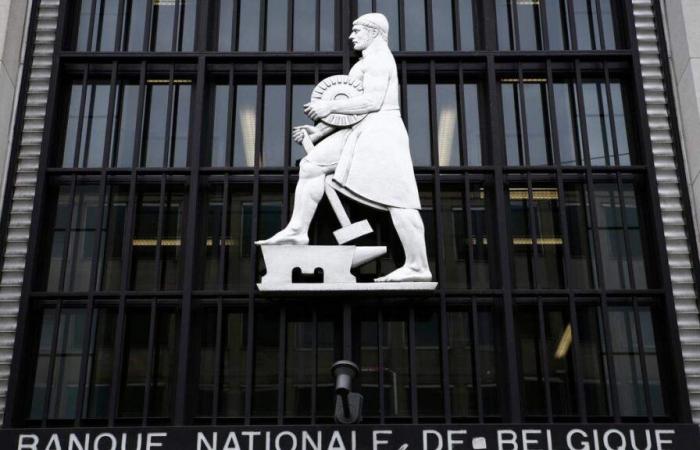Pierre Wunsch is what journalists call a “good customer”. The Governor of the National Bank of Belgium (BNB) speaks Cash and is generally not mystery of his opinions, often decided. The latest interview delivered to the French -speaking newspaper The evening does not derogate from the rule.
Belgian public finances? Concern, according to Pierre Wunsch. Arizona, the government coalition of Prime Minister Bart de Wever, will not be able to keep its promise to bring the deficit under 3% of GDP before the end of the legislature, as required by the European Commission.
The Governor of the BNB highlights the difficulty of the budgetary equation which presents itself to the Wever government in the face of the two constraints it has imposed: “no new tax” and “we do not touch health care”. “Wanting to clean up public finances with health care expenses that increase faster than GDP and excluding an increase in taxes, it is not impossible, but it is very complicated,” he explains.
The savings currently scheduled would also be insufficient. The taxation of the rich would only lead to scare them abroad. Good news all the same: the impact of 20% customs duties that Donald Trump wants to impose on European products would be “absorbable”.
As for the Brussels region, still without government, its finances would be “drift”. “The Brussels deficit represents around 1.5 billion euros, which corresponds to 7% of the Belgian deficit while Brussels represents only 2% of national public spending.” Faced with this situation, the Governor of the BNB recommends “limiting breakage”.
No climate neutrality in 2050
But it is on the climate that Pierre Wunsch really turns on the wick of the controversy. If he recognizes the reality of global warming and the need for transition, the governor also criticizes strongly “excess of optimism” that surrounds him.
According to him, Europe will not reach its objective of climate neutrality in 2050, the transition will cost citizens much more than what they have been believed to be. It will also be done at the expense of European industry competitiveness in the face of global competition.
Pierre Wunsch also fears that European efforts have only a limited impact if the rest of the planet, especially after the American withdrawal from the Paris Agreement, does not follow the same path.
-These words aroused strong reactions in the environmental environment. Nadia Cornejo, political advisor to Greenpeace Belgium and vice-president of the climate coalition, says she is “paid” by the governor’s statements: “Climate neutrality is not a question of optimism, it is simply to use what science says. We have no choice, we must achieve this goal as soon as possible, that is to say in 2050 ”.
Nadia Cornejo firmly condemns the position of the governor who, according to her, “fuels a form of spiral of inaction: for him, it is too complicated, it is too expensive, our neighbors do nothing and therefore why to impose all of this, let’s do the minimum union. However, the objective of neutrality is not questionable, it is scientific, and it is about our survival ”.
Regarding European isolation in climatic efforts, Nadia Cornejo vigorously challenges: “Even if Trump is withdrawing from the Paris Agreement, he will not succeed in killing the green transition which is on states like Texas or California. Ditto in China and India, where governments are clearly aware of the impact that global warming has on their populations. They embarked on massive investments in renewable. In China, it goes much faster than us! ”
On the question of financing the transition, it suggests applying to climatic expenses the same budgetary relaxation as that granted to defense expenses by the European Commission. It also refutes the distinction made by Wunsch between climate and social justice: “The transition goes hand in hand with social justice and therefore the taxation of the richest. We know that the 1% of the richest people generate as many emissions as the poorest 5 billion human beings. ”
“There is no escalation”
Always in the columns of EveningHugues Goosse, climatologist and professor at UClouvain, joins this criticism by highlighting the already observed gravity of climatic impacts: “You see fires in southern Europe or heat waves that make several hundred, even thousands of deaths in our regions: personally, I already find it very serious”.
Pierre Wunsch also wondered about a possible “publication bias” which would encourage researchers to blacken the climate table. For Professor Goosse, “this bias does not exist, there is no escalation”. The academic recalls that scientific articles are subject to rigorous evaluation by peers and that “the more exceptional your affirmation, the more rigorously it should be supported”. What is called in scientific language the “peer review”.
The statements of the Governor of the National Bank come in a difficult context. Belgium and its regions (which are maneuvering on the environmental file) are regularly crossed. Last January, according to a “provisional inventory” communicated by the European Commission, it appeared that the country is far away at this point of having reduced its greenhouse gas emissions by 47% compared to 2005 as he engaged. It remains accordingly at the right distance from its 2030 objectives and, according to experts, it is completely dropped with regard to those of 2050.








